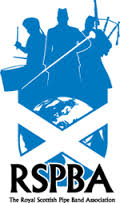RSPBA taking another look at prescribed tunes
 The Royal Scottish Pipe Band Association (RSPBA) is reviewing competition playing requirements for Grade 4A and Grade 4B bands, issuing a survey to pipe-majors specifically reviewing its Musical Appreciation & Presentation (MAP) system of prescribed tunes that it introduced in 2006.
The Royal Scottish Pipe Band Association (RSPBA) is reviewing competition playing requirements for Grade 4A and Grade 4B bands, issuing a survey to pipe-majors specifically reviewing its Musical Appreciation & Presentation (MAP) system of prescribed tunes that it introduced in 2006.
It is at least the second reassessment of the program since the organization conducted a similar survey following the 2006 season.
Grade 4 bands competing at major championships currently have to select music from a set list of tunes and settings created by the RSPBA’S Music Board. The list of tunes contains mainly old chestnuts, along with a few outlier “modern” compositions.
Two essential questions are going out to band leaders:
- “Do you feel the competition playing criteria is appropriate for your grade?”
- “Do you feel this format provides a level playing field within your grade?”
Pipe-majors have to submit hand-written answers, and are asked to provide details of who submitted the form, including a signature.
The MAP system was ushered in in part to address the perceived problem of lower-grade bands not learning the fundamentals of pipe band playing. Then Music Board leader and twice World Championship-winning pipe-major with the now defunct Dysart & Dundonald, Bob Shepherd, helped to spearhead the program.
With an increasing number of non-RSPBA-member bands travelling to the World Championships, the implications of the MAP system are widespread. Few other associations have adopted such an initiative, giving RSPBA member bands a potential advantage at the World’s. Many international Grade 4 bands planning to compete in Scotland will prepare their local selections with MAP tunes.
In a statement to its Grade 4 bands, the RSPBA stated that results will be gathered after July 1, and that its Music Board will report findings to its Board of Directors in October. It stresses that a non-response will be considered acceptance and approval of the current system.
“Any changes would need to go to the Board of Directors and possibly the AGM, depending on what is in the results of the survey,” RSPBA Music Board Chair Bruce Cargill said.
The RSPBA’s message to member bands stated: “If you want to be heard Read it-Complete it-and Send it. [sic] Thank you for helping us to better your Association.”
The Eastern United States Pipe Band Association (EUSPBA) adopted a similar prescribed tune approach shortly after the RSPBA’s introduction of the MAP system, and use a similar list of tunes recommended to be submitted in competition. The organization subsequently decided to soften its approach.
+ EUSPBA may drop MAP-style program
“We do not have a required set list of tunes however we do have a suggested list of tunes for lower grade bands to choose from,” said EUSPBA President Jim Dillahey. “We allow each band to choose their own selections provided they meet specific guidelines. Bands are encouraged to choose tunes from the suggested list, but not required.”
Critics of the MAP program contend that it stifles creativity and is designed mainly to make judging easier, while those who like it enjoy its adherence to traditional pipe band customs.
It is believed that invitations to complete the survey went only to RSPBA member bands, and not to Grade 4 bands from other organizations that have competed recently at RSPBA major championships.
The Grade 4A and Grade 4B contests at the 2017 World Pipe Band Championships were won, respectively, by the 3rd Battalion the Royal Regiment of Scotland and College of Piping (Summerside).
+ Inveraray & District: World Championship #1
It’s an important topic. How do you feel about pipe band associations creating lists of tunes that bands have to play? Use our handy (and anonymous, if you wish, although we’d prefer you put your name to your thoughts) comments feature below.

I think the MAP tunes have been great for pipe bands. There are still ways to be creative with these tunes, but at these levels it is about developing skills. Listening to the quality of UK pipe bands in every grade, I would argue that—in some way—the MAP experiment has been successful. I hope the UK bands see it that way.
I think they’ve done a pretty good job with the program. There is enough variety and a sufficient range of difficulties represented that bands can A) choose tunes that play to their strengths and B) avoid all playing the same thing. I think allowing the selection of 4-parted tunes of reasonable difficulty was a critical change: it allowed bands to adequately prepare for the next grade. As long as the list is maintained and updated frequently, the “old chestnuts” problem can be avoided.